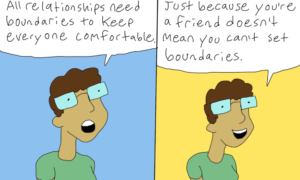If they don’t go “yeah,” then there’s no consent.
Those things don’t just disappear. Everything’s not out there that’s perfect.
I feel like everyone should consider themselves a feminist.
You do something right and somebody notices and it feels like you’re glowing.
(Title Card: Connecting the Dots. Consent.)
Amado: Alright, so our first topic up, we wanted to talk about, “consent.” For us, we didn’t really talk about it in high school. I know I didn’t. My other used to yell at my brother and I before we left the house like, “No means no, and don’t get anyone pregnant.” That’s all she would tell us. But then I was gay, so I didn’t really have to worry about it. I was like, “I’m good.” I was wondering, like, do you guys talk about consent with each other, like in school, like is that a topic that comes up?
Kennedy: Lot of self-proclaimed feminists in my friends groups are always talking about it and always like try to educate the other people in our friend group who don’t really see the like – not the importance – but they just don’t really acknowledge it? Like kind of like not talking about it, right? So we try to, like, talk about it quite often. We do have to talk about it quite often in my friend group.
Chelsea: No one ever pulls up like a news article or something from the other day and say like, “We should talk about this, guys.” It’s more like, stuff that happens within our community. You know, someone gets hurt because they didn’t give consent to doing something or, you know, wanting something, and then that kind of sparks something in a way we can literally feel the wave ripple across everyone.
Amado: But is it something that girls talk more about or boys? Like do boys mention consent?
Logan: Like I just – I hang out with all girls so I don’t really know what the guys talk about. But like, when we’re hanging out and that kind of thing, the only time it comes up is when they don’t realize that someone didn’t ask and that it was an issue. Is they think like it was just, “Oh that’s just his game.” Or, “Oh, he was just being savage,” or whatever. No, it’s not okay. And then, that’s how it usually comes up because there’s a lot of girls that don’t understand that that’s a power they have. They think that a lot of the time it’s something they have to abide by and appease to.
Lily: I think you bring up a really interesting point, that it’s kind of an afterthought.
Amado: How’s it communicated?
Logan: Okay, so well like recently, we were just like, “Oh and then it was just kind of, yeah, and then this happened and that happened,” it was just like, “Oh my god,” and we’re telling her like, “That’s serious.” We need to understand that that’s something you have a right to say no to.
Kennedy: Yeah I think you could say no in like, a lot of different ways, instead of like saying, “No!”
Jacquelin: If you are just hooking up with someone, I think you can make that like sexy like, “Oh like I want to kiss you.” It doesn’t need to be like this, “Okay, like, yes or no, could you like sign this contract, I’m going to place my lips on yours now.” It doesn’t need to be awkward. Like I think it can be kind of a cool thing.
Devon: It’s no longer like, “no means no,” like people have changed it to “yes means yes,” because if there’s no “yes” then there’s no consent.
Jacquelin: And anything else means “no.”
Devon: Yeah, instead it has to be affirmative, it’s not just a lack of a “no.”
Amado: I mean, whose side does it fall on then? Is it the girl’s responsibility to say, “Yes this is okay,” or is it the boy’s responsibility to ask?
Logan: Whoever is doing the coming on to needs to be the one asking, because the other person wasn’t like necessarily asking to be come on to whatsoever, it’s the other person making a conscious decision and a response to that should be to ask.
Devon: Like, I never want to talk about consent in terms of gendered roles, because it’s not. It has to apply to everyone for whatever the mix of people involved.
Amado: Does consent function differently in same-sex couples?
Devon: Like you were saying, your mom would tell you and your brother, like, “Don’t get anyone pregnant, no means no.” But would she have said that if you had a sister?
Amado: Yeah exactly, if you were a girl. That’s a great question. I don’t know.
TY: It was never taught, never focused on and I know a lot of people in my class didn’t know about it. A lot of people were, like, would question about, “What does consent really mean?”
Jacquelin: Maybe there was like an offhand comment or something from a teacher like, “Oh you know, if everyone’s happy that’s great, and if not, then that’s not so great,” but never explicitly… that’s all the education you get, unless you’re seeking outside resources which a lot of kids just may not think to do.
Devon: I’m in grade 12 now, and the last time we talked about Sex Ed at all was in grade 9. Health class or – Gym class, the last time they’re like, “You have to take Gym.” If we even talked about consent then, I’m not sure.
Amado: And it was surely not same-sex consent.
Devon: Oh absolutely not. No, it was like you present on gonorrhea and you put a condom on a banana and then you’re done.
Amado: Well it’s also like, Health class kind of seems quite obvious, in this day and age, I think it’s like, “We got the condom part.” You know, it’s the wider culture issues that are more complex that we should talk about like this. What if you were dating someone, and you’ve been dating for awhile, do all the consent rules go out the window?
Logan: There’s no point in time where anyone’s relationship with you takes away your body autonomy.
TY: Again, like, it’s your own body, like you just may not be feeling it that day, you just don’t want to do it, it’s like you can’t try and shame them for not “being in the mood.”
Amado: You could still date and not want to have sex for awhile, or maybe not throughout all of high school, or maybe not until you’re ready. There’s that whole idea.
Lily: And also, another thing, relationships, I think, a lot of people see it as “a proof of their love,” and if like, “If I don’t have sex with this person, they’re going to take I don’t love them.” And that’s not the case.
Jacquelin: Or, I mean, also, sometimes you’ll hear, “You know, if you don’t do it with me, I’ll find someone else that will,” and that’s an abusive dynamic.
Amado: People find themselves in scenarios where they drink too much, or you know, whatever substances they did, it leaves them, I guess, unable to speak for themselves in the most responsible way. Whatever happens in those scenarios?
Jacquelin: If both people are drunk and there’s still one person who isn’t consenting, like she’s literally saying no, I mean obviously, that’s rape. Even if this other person, even if the aggressor is equally as drunk, that’s still not a defense.
Logan: A no is a no, like no matter what kind of no that is, period.
Jacquelin: How drunk do you really have to be to hear through “no no no, stop” and you know, still keep going with that?
Lily: One of my friends, she went to university, first week, got drunk, lost her virginity, and she regrets it so much. But in that moment, she was so excited about it. And in that moment, she didn’t stop him. But it’s because, you know, she wasn’t sober. So like, I don’t think that really counts as consent.
Amado: Like I feel like if any of our parents were sitting right here now, they’d be like, “Oh god, this conversation.” Just probably have a heart attack, for these reasons. Because we are going to go out and party. We are going to make mistakes.
Chelsea: The dangerous side of that is that people want to avoid what they fear, so if we’re so scared about this kind of topic, then obviously, if our parents are here, in their generation especially they had more fear than we did, and they never talked about that kind of thing, so if we keep perpetuating that kind of fear, we’re never going to get to the place we need to be.
Logan: There’s also the whole façade of like, the guys can’t be like, “Can I… can I kiss you?” They have to be always the aggressor.
Amado: You know there’s this whole idea with the men being the aggressor, “That girl’s hard-to-get.” Maybe it’s hard to get because we don’t want you to get it! What if you’re sending like flirtatious messages, you’re sexting, is that kind of an implication that you kind of have to eventually say yes?
Logan: No, I don’t like there’s any type of groundwork you can lay at any kind of like preparation or you try to trap them into, that they have to keep a specific response. You could go out for a nice date. You could’ve had a little make-out session before. You could’ve been like, “Yeah let’s go hang out at my bedroom.” All of it. You could be down to like the last second before something happens, a “no” is still valid. There’s not a single thing you could do to make that “no” or that like “how about you kind of back off me?” any less valid.
Amado: You guys are awesome. This was a sensational conversation. I can talk, honestly here, all day long. Awesome man, you guys are champs. Thank you so much. Thank you so much, this is going to be so awesome.




















